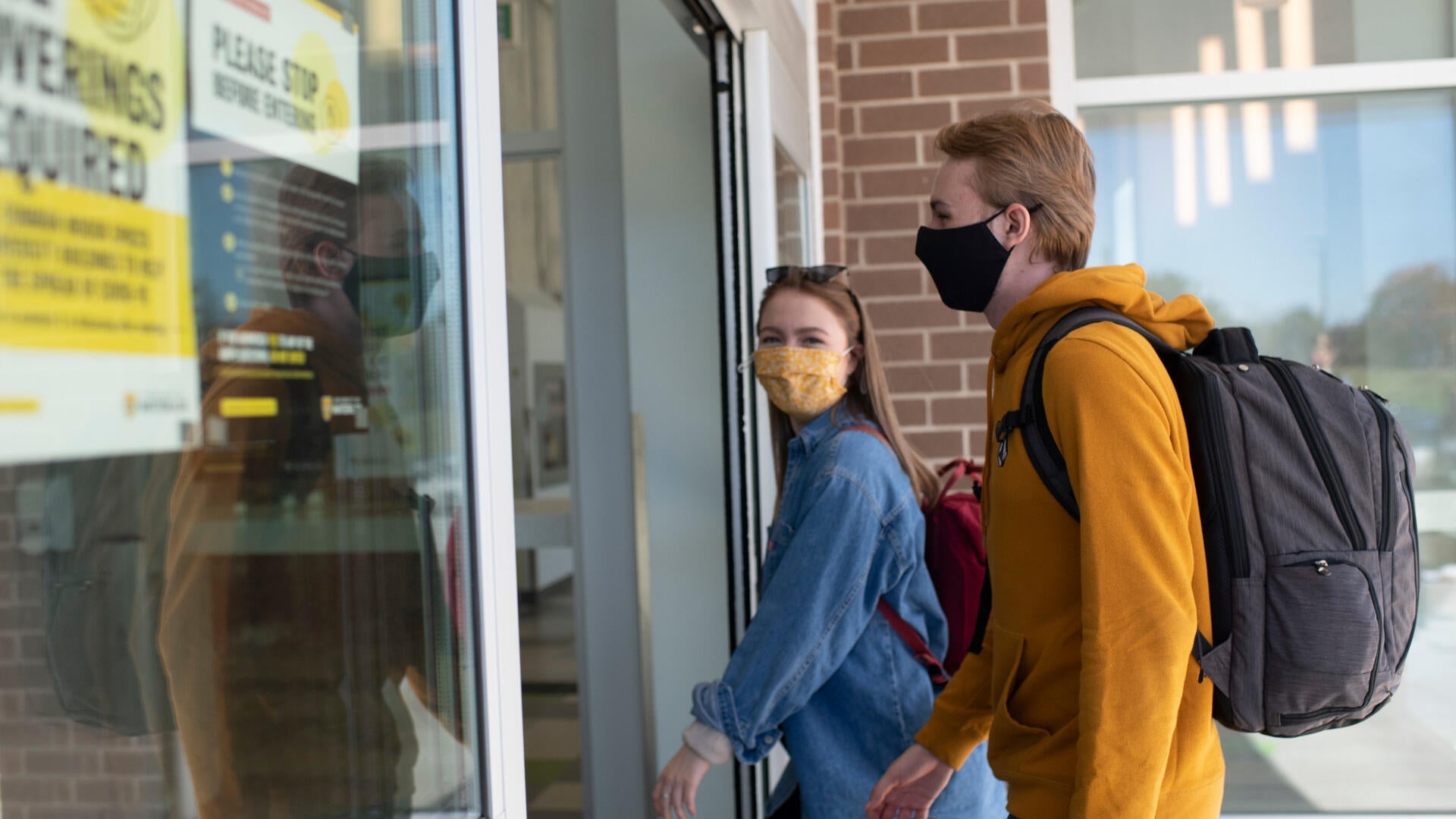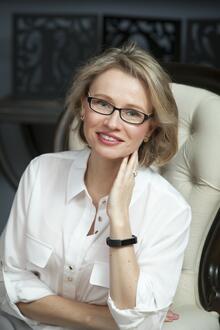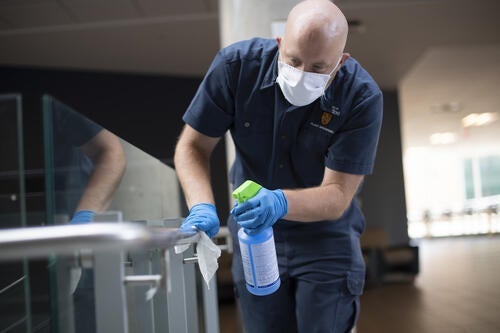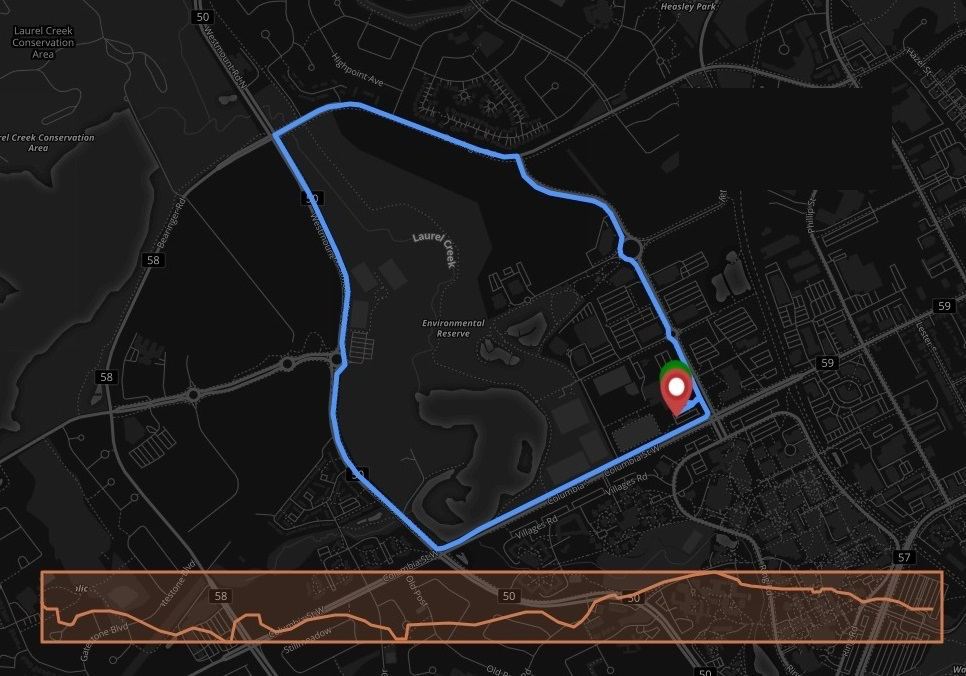Editor:
Brandon Sweet
University Communications
bulletin@uwaterloo.ca
Waterloo upgrades ventilation systems across campus

This article originally appeared on Waterloo News.
While most COVID-19 infections are spread through close contact with an infected person, in some cases, they can occur through extended airborne exposure, making proper ventilation essential. For the past year, Waterloo’s mechanical design teams and trade staff have been inspecting the heating, ventilation and air conditioning (HVAC) units on campus, making retrofits to support higher levels of filtration and reprogramming our Building Automation Systems (BAS) to accommodate building occupancy and new guidelines for health and safety.

“We’ve had more than 350 trades, custodial and grounds staff on our campuses daily to ensure that our campus spaces remain safe and functional,” says Stepanka Elias, executive director of plant operations. “Buildings require a lot of upkeep whether people are in them or not, from temperature control and ventilation to electrical and plumbing. Based on the advice of public health officials and other professional associations, we’ve been modifying cleaning priorities, making upgrades to our HVAC systems and focusing on preventative maintenance measures.”
Waterloo’s campuses have 63 major buildings with 398 HVAC units, supporting a variety of research, teaching and staff and student activities. Since November 2020, every building has been retrofitted to accommodate MERV13 filters. MERV13 filters are recommended by the American Society of Heating, Refrigeration and Air-Conditioning Engineers and over the pandemic have become standard across the industry because they are more effective at filtering small droplets and particles that travel through the air (at least 85 per cent efficient at capturing particles in the 1 µm to 3 µm size range).
Elias says that the Plant Operations team is striving for improvements every day. When asked about filters that go above and beyond current standards, she says that MERV14 may provide slightly better performance, but are physically too large for our ventilation systems. HEPA filters, although very efficient, may strain ventilation systems and reduce air flow.
Air exchange rates in campus buildings vary, for example, wet science and engineering labs are typically supplied with 100 per cent outside air and have high air exchange rates to limit exposure to various chemical and biological agents. This makes lab environments inherently safe when it comes to filtration of virus particles. Other spaces such as dry labs and classrooms have been designed with comfort in mind and therefore have lower air exchange rates. The mechanical engineering team is reviewing the air flow for all classrooms in preparation for fall.
“Everybody has worked hard through the stress of the pandemic and many employees have taken on new COVID-related tasks” says Elias. “There’s a feeling of UWaterloo pride and community spirit as we all band together to maintain our campuses, keep people safe and prepare for the gradual return of our students, faculty and staff in the fall.”

A member of the Plant Operations team disinfects high-touch surfaces in the STC building.
In addition to upgrades to ventilation systems across campus, campus cleaning, especially to high touch surfaces, is a priority that is being reviewed and modified regularly by the Plant Operations team. Common areas, classrooms and workspaces on campus have occupancy limits and have been modified to allow for safe physical distancing. Plexiglass has been installed in service areas and hand-sanitizing stations have been placed at building entry points and elevators. Clear and visible signage will also help inform and direct those returning to campus in the fall.
Two positive COVID-19 cases at Waterloo hockey summer camp
On Tuesday, July 13, 2021, Region of Waterloo public health informed the University that two individuals who attended a hockey day camp at the University of Waterloo last week have tested positive for COVID-19. As a result, officials declared the cases an outbreak of COVID-19 at the day camp.
The Ministry of Education and the Ministry of Health have defined an outbreak as two or more lab-confirmed COVID-19 cases in students and/or staff with an epidemiological link, within a 14-day period, where at least one case could have reasonably acquired their infection at the camp.
Public health officials have contacted all known close contacts of the individuals affected. If you or your camper have not been identified as a close contact of the individuals, you should self-monitor for symptoms of COVID-19 and seek testing if needed.
Our Department of Athletics and Recreation teams are working with Region of Waterloo Public Health to prevent further spread of COVID-19 in children, staff and the community. Our camp protocols and policies follow the guidelines put in place by the Public Health Services of Waterloo. These include:
- cohorts no bigger than 15 campers
- no interaction between camp cohorts
- limited equipment sharing (only within each cohort)
- camp counselors will stay with the same cohort all week
- staff and campers will wear PPE as required by government guidelines
- activities will reflect COVID protocols (i.e., if we're not able to re-create game play, we will have socially distanced games and activities for the campers)
- spaces will be thoroughly sanitized between cohort use
- daily screening and attestation
- outdoor check-in points for campers & parents
Professor joins Green Party shadow cabinet as climate critic
This article was originally published on the Faculty of Arts website.
Last week Professor Imre Szeman assumed the role of the Green Party of Canada’s senior Climate Critic, a role within the party’s Shadow Cabinet for Environment and Climate Change. It is not an elected position but one that allows Szeman and other experts in the shadow cabinet to voice critical perspectives on Canada’s climate present and future.

Szeman is a University Research Chair in environmental communication and a faculty member in the Department of Communication Arts. His work explores the social and cultural transformations required to bring about a transition to sustainable forms of energy. In 2020 he was named a Fellow of the Royal Society of Canada, recognizing his international acclaim as a public-facing scholar and a pioneering expert in the field of energy humanities.
According to the Green Party announcement, “The Shadow Cabinet of the Green Party of Canada is an alternative cabinet which shadow/mirror government portfolios in most cases. Shadow Cabinet Critics play a vital role in promoting bold Green policies and priorities, serving as spokespeople for the Green Party, and offering policy solutions based on member-approved policies.”
Szeman adds that he expects his role will lead to the creation of future opportunities for students and student research in coming years.
Read more about Imre Szeman’s research: Becoming a renewable energy society.
Thursday's notes

It's time to start running! A fellow staff member is once again organizing the Tuesdays & Thursdays running group on campus. The aim is to improve physical and mental health by exercising and having fun. The T&T Running Group will have its first meetup at the corner of the School of Optometry and Vision Science and Laurel Trail by the Columbia Street rail tracks on Tuesday, July 20 at 12:10 p.m. "The group is strictly recreational and social in nature," says the note from the running group. "We will run/walk a 5K loop, and all participants are invited to either run or walk at their own pace. Participation in the group is free and no attendance will be taken."
For more information on the T&T Running Group contact Carlos Radic of Mechanical Design Services via email.
The next talk in the CrySP Speaker Series on Privacy will feature Angela Sasse from Ruhr Universität Bochum, speaking on the topic of "Digital fitness instead of blame and entrapment: re-framing "security awareness"."
Security awareness, education and training (SAET) is big business - the amount spent globally on anti-phishing training alone was $1bn in 2020.
"It is the "first resort" of security practitioners seeking to "fix" people who don't follow the rules because they are "weak" and "careless"," says the asbtract for the talk. "This talk will explain why most current activities — which largely consist of information on threats and what behaviors to adopt, deployed in fire-and-forget fashion — is not sufficient to make secure behavior a routine. And why attempts to "motivate" secure behavior through "teachable moments" and persuade people to adopt them through "nudges" ignore well-established knowledge on routine behavior, and what is required to change it. I will present a series of steps that people go through when changing behavior, and show how organizations can support them. Finally, I will make the case for re-branding this activity as digital fitness — a set of good habits for the 21st century."
M Angela Sasse is the Professor of Human-Centred Security at Ruhr University Bochum, which run the largest academic programme in IT Security in Europe. She obtained an MSc in Occupational Psychology and a PhD in Computer Science before joining the Computer Science Department at UCL in 1990, where she still retains a part-time position. The paper Users Are Not The Enemy, co-authored with her student Anne Adams, is one of the founding papers of Usable Security Research.
The event takes place on July 23 at 11:00 a.m. on Zoom.

The WCC is hiring: "The Writing and Communication Centre is looking for undergraduate students from all faculties to be Peer Tutors, and undergraduate students from the Faculty of Arts to be Arts First Peer Tutors for the upcoming year," says a note from WCC. "Our team of peer tutors meet with their peers to coach them on their assignments and other documents. For more information or to apply, visit our Opportunities page."
Link of the day
Bend and snap: Legally Blonde at 20
When and Where to get support
Students can visit the Student Success Office online for supports including academic development, international student resources, leadership development, exchange and study abroad, and opportunities to get involved.
Instructors can visit the Keep Learning website to get support on adapting their teaching and learning plans for an online environment.
Course templates are available within your course in LEARN to help you build and edit your content and assignment pages quickly.
The following workshops, webinars, and events are offered by the KL team (CTE, CEL, ITMS, LIB):
- Independent Remote Course Design Essentials, self-directed, continuous self-enrollment course in LEARN.
-
Introduction to PebblePad: What is PebblePad and Why Would I use it? Thursday, July 15, 10:00 a.m.
Employees can access resources to help them work remotely, including managing University records and privacy of personal information. Here are some tips for staying healthy while working from home.
Stay informed about COVID cases on campus by consulting the COVID case tracker.
The Writing and Communication Centre has virtual services and programs to help undergrads, grad students, postdocs and faculty members with academic writing.
- Meet with writing advisors in one-to-one appointments to brainstorm, draft, revise, and polish. No time for an appointment? Try email tutoring for undergrads.
- Beat isolation and make writing progress at weekly Virtual Writing Cafés for grad students and faculty or PJ-Friendly Writing Groups for Undergrads.
- Take an online workshop or apply to our popular Dissertation Boot Camp program.
- Faculty can request custom in-class workshops for their courses, or the WCC can facilitate any existing workshops for student groups.
Co-op students can get help finding a job and find supports to successfully work remotely, develop new skills, access wellness and career information, and contact a co-op or career advisor.
The Centre for Career Action assists undergraduates, graduate students, postdocs, staff, faculty, and alumni through navigating career services that are right for them. You can attend a one-on-one appointment or same day drop-in session at the CCA for assistance with cover letter writing, career planning and much more. You can also book an appointment online or visit our Live Chat to connect with our Client Support Team. The CCA is here to help you.
If you feel overwhelmed or anxious and need to talk to somebody, please contact the University’s Campus Wellness services, either Health Services or Counselling Services. You can also contact the University's Centre for Mental Health Research and Treatment. Good2Talk is a post-secondary student helpline available to all students.
The Library has published a resource guide on how to avoid information overload.
The Faculty Association of the University of Waterloo (FAUW) continues to advocate for its members. Check out the FAUW blog for more information.
The University of Waterloo Staff Association (UWSA) continues to advocate for its members. Check out the UWSA blog for more information.
The Indigenous Initiatives Office is a central hub that provides guidance, support, and resources to all Indigenous and non-Indigenous campus community members and oversees the university Indigenization strategy.
The Waterloo Indigenous Student Centre, based at St. Paul’s University College, provides support and resources for Indigenous students, and educational outreach programs for the broader community, including lectures, and events.
WUSA supports for students:
Peer support - MATES, Glow Centre, RAISE, Women’s Centre - Visit https://wusa.ca/peersupport to book an appointment
Bike Centre – Open via Appointments and Rentals
Campus Response Team, ICSN, Off Campus Community and Co-op Connection all available online. Check https://wusa.ca for more details.
Food Support Service food hampers are currently available from the Turnkey Desk on weekdays from 7:30 a.m. to 7:00 p.m. in the Student Life Centre. If you have any questions please email us at foodsupport@wusa.ca.
Centre for Academic Policy Support - CAPS is here to assist Waterloo undergraduates throughout their experience in navigating academic policy in the instances of filing petitions, grievances and appeals. Please contact them at caps@wusa.ca. More information is available.
WUSA Commissioners who can help in a variety of areas that students may be experiencing during this time:
- Equity – equity@wusa.ca
- Co-op and Experiential Affairs – coop.affairs@wusa.ca
WUSA Student Legal Protection Program- Seeking legal counsel can be intimidating, especially if it’s your first time facing a legal issue. The legal assistance helpline provides quick access to legal advice in any area of law, including criminal. Just call 1-833-202-4571.
Empower Me is a confidential mental health and wellness service that connects students with qualified counsellors 24/7. They can be reached at 1-833-628-5589.
When and Where (but mostly when)
Healthy Warriors at Home(Online Fitness)
Fitness Classes on Warrior Field. Starting June 14. Power Yoga, HIIT and Zumba. Only $4/class. Advanced registration required.
Warriors vs. Laurier Blood Donation Battle. Join your fellow Warriors, donate blood and help us win the Blood Battle against Laurier for a second year in a row. Set up a profile or add the PFL code: UNIV960995 to your account if you have a blood.ca account already. Questions? Contact WarriorsInfo@uwaterloo.ca.
Drop-in to Warrior Virtual Study Halls on Wednesdays from 5:30 p.m. to 7:00 p.m. Come together in this virtual space to set goals and work independently or in groups each week.
Warriors Custom Varsity Apparel. On sale July 7 to July 21. Show your Warriors pride with the line-up of customizable apparel including dry-fit tees, Nike Hyper Dry Hooded Long Sleeves and Nike Fleece Hoodies from W Store. Please note that this will be your only opportunity this year to purchase sport specific black and gold gear. Order today at www.gowarriorsgo.ca/customapparel
Renison English Language Institute continues to offer virtual events and workshops to help students practice their English language skills.
Renison/WPL Lecture series, Invisible Heartbreak: Personal Support Workers Share Their Front Line Experiences, Tuesday, July 20, 7:00 p.m.
CrySP Speaker Series on Privacy, "Digital fitness instead of blame and entrapment: re-framing "security awareness,"featuring Angela Sasse, Ruhr Universität Bochum, July 23, 11:00 a.m. Zoom link.
UWSA Open Consultation Session - Updated MOA, Tuesday, July 27, 12 noon.
PhD oral defences
Physics & Astronomy. Wan Cong, “Quantum Probings of Curved Spacetimes.” Supervisors, David Kubiznak, Robert Mann. Thesis available by request from SGO – science.dissertations@uwaterloo.ca. Oral defence Thursday, July 22, 9:00 a.m.
Statistics and Actuarial Science. Bing Feng Xie, "Failure Time Analysis with Discrete Marker Processes under Intermittent Observation." Supervisor, Richard Cook. Thesis available from MGO - mgo@uwaterloo.ca. Oral defence Thursday, July 22, 2:00 p.m.
Chemistry. Cheryl Sturm, “Thermoelectric Properties of Coinage Metal Chalcogenides.” Supervisor, Holger Kleinke. Thesis available by request from SGO – science.dissertations@uwaterloo.ca. Oral defence Thursday, July 22, 2:00 p.m.
Physics & Astronomy. Paul Tiede,”The Nature and Impact of Active Galactic Nuclei.” Supervisor, Avery Broderick. Thesis available by request from SGO –science.dissertations@uwaterloo.ca. Oral Defence Friday, July 23, 2:30 p.m.
Computer Science. Masoumeh Shafieinejad, "Data Protection in Big Data Analysis." Supervisor, Florian Kerschbaum. Thesis available from MGO - mgo@uwaterloo.ca. Oral defence Tuesday, July 27, 11:00 a.m.